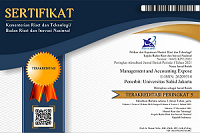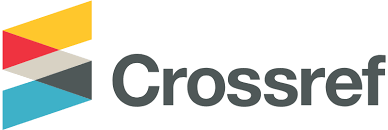Dampak Locus Of Control, Sikap Keuangan, Pendapatan, dan Religiusitas terhadap Perilaku Keuangan
Abstract
Anggota organisasi kemasyarakatan berbasis agama memiliki pandangan yang khas mengenai faktor spiritual yang berdampak pada perilaku kesehariannya. Penelitian ini bertujuan menganalisis perilaku keuangan anggota organisasi Muhammadiyah, Kabupaten Bantaeng, Sulawesi Selatan ditinjau berdasarkan prediktor locus of control, sikap keuangan, pendapatan dan religiusitas. Teknik analisis menggunakan regresi linier berganda, dengan sampel jenuh. Hasil penelitian menyimpulkan bahwa variabel locus of control, sikap keuangan, pendapatan dan religiusitas baik secara parsial maupun simultan berpengaruh signifikan terhadap perilaku keuangan anggota Muhammadiyah. Variabel yang paling dominan dalam mempengaruhi perilaku keuangan adalah pendapatan.
Keywords
Full Text:
PDFReferences
Amar, M. Y., Syariati, A., & Rahim, F. R. (2019). Enhancing Hotel Industry Performance
Through Service Based Resources and Strategic Enterpreneurship (Case Study At
Hotel Industries In Indonesia). Academy of Entrepreneurship Journal, 25(3), 1-10.
Ameliawati, M., & Setiyani, R. (2018). The Influence of Financial Attitude, Financial
Socialization, and Financial Experience to Financial Management Behavior with
Financial Literacy as the Mediation Variable. KnE Social Sciences. International
Conference on Economics, Business and Education 2018, 811-832.
Ashraf Ali, K. (2016). Impact of Religiosity on Buying Behavior of Financial Products: A
Literature Review. International Journal of Finance and Banking Research, 2(1), 18-
Boone, C., Van Olffen, W., & Van Witteloostuijn, A. (2005). Team Locus-of-Control
Composition, Leadership Structure, Information Acquisition, and Financial
Performance: A Business Simulation Study. Academy of Management Journal, 48(5).
Britt, S., Cumbie, J. a., & Bell, M. M. (2013). The Influence of Locus of Control on Student
Financial Behavior. College Student Journal.
Delafrooz, N., & Paim, L. (2011). Personal Saving Behavior among Malaysian Employees:
Socio Demographic Comparison. International Conference on Social and Humanity.
Enrico, A., Aron, R., & Oktavia, W. (2013). The Factors that Influenced Consumptive
Behavior: A Survey of University Students in Jakarta. SSRN Electronic Journal.
Falahati, L. (2011). A comparative study in Money Attitude among University Students: A
Gendered View. Journal of American Science.
Ghozali, I. (2013). Aplikasi Analisis Multivariate dengan Program IBM dan SPSS 21. In
Aplikasi Analisis Multivariate dengan Program IBM SPSS 21. Semarang : Penerbit
Universitas Diponegoro.
Hair, J. F., Hult, G. T. M., Ringle, C. M., & Sarstedt, M. (2014). Partial Least Squares
Structural Equation Modeling (PLS-SEM). Sage Publisher. European Business
Review, 26(2), 106-121.
Hess, D. (2012). The Impact of Religiosity on Personal Financial Decisions, 14, 1–13.
Hilary, G., & Hui, K. W. (2009). Does Religion Matter in Corporate Decision Making in
America? Journal of Financial Economics, 93(3), 455-473.
Ida, & Dwinta, C. Y. (2010). Pengaruh Locus of Control, Financial Knowledge, Income
Terhadap Financial Management Behavior. Jurnal Bisnis Dan Akuntansi.
Kashyap, R., & Iyer, E. S. (2009). Not Everybody Wants to Save the World. Journal of
Financial Services Marketing, 14, 118-134.
Lai, C. W. (2010). How Financial Attitudes and Practices Influence the Impulsive Buying
Behavior of College and University Students. Social Behavior and Personality : an
International Journal, 38(3), 373-380.
Meghir, C., & Pistaferri, L. (2011). Earnings, Consumption and Life Cycle Choices. In
Handbook of Labor Economics, 4, 773-854.
Nofsinger, J. R. (2001). The Impact of Public Information on Investors. Journal of Banking
and Finance, 25(7), 1339-1366.
Oviedo Celina, H., & Campo-Arias, A. (2005). An Approach to the Use of Cronbach’s Alfa.
Revista Colombiana de Psquiatría.
Panayides, P. (2013). Coefficient Alpha: Interpret with Caution. Europe’s Journal of
Psychology, 9(4).
Parmitasari, R. D. A., Alwi, Z., & S., S. (2018). Pengaruh Kecerdasan Spritual dan Gaya
Hidup Hedonisme terhadap Manajemen Keuangan Pribadi Mahasiswa Perguruan
Tinggi Negeri di Kota Makassar. Jurnal Minds: Manajemen Ide Dan Inspirasi, 5(2),
-162.
Perry, V. G., & Morris, M. D. (2005). Who is in Control? The Role of Self-Perception,
Knowledge, and Income in Explaining Consumer Financial Behavior. Journal of
Consumer Affairs, 39(2), 299-313.
Renneboog, L., & Spaenjers, C. (2012). Religion and Finance. In Socially Responsible
Finance and Investing : Financial Institutions, Corporations, Investors, and Activists.
Chapter 8. John Wiley and Sons, Inc.
Ricciardi, V. (2008). The Psychology of Risk: The Behavioral Finance Perspective. In
Handbook of Finance. John Wiley and Sons, Inc.
Robbins, S., & Judge, T. (2009). Organizational Behaviour: Concepts, Controversies,
Applications. In Development.
Rotter, J. B. (1966). Generalized Expectancies for Internal Versus External Control of
Reinforcement. Psychological Monographs, 80(1), 1-28.
Shefrin, H., & Statman, M. (2000). Behavioral Portfolio Theory. The Journal of Financial and
Quantitative Analysis, 35(2), 127-151.
Sitepu, N. I. (2017). Perilaku Konsumsi Islam Di Indonesia. Jurnal Perspektif Ekonomi
Darussalam. 2(1), 91-106.
Sohn, S. H., Joo, S. H., Grable, J. E., Lee, S., & Kim, M. (2012). Adolescents’ Financial
Literacy: The Role of Financial Socialization Agents, Financial Experiences, and
Money Attitudes in Shaping Financial Literacy Among South Korean Youth. Journal
of Adolescence, 35(4), 969-980.
Spector, P. E. (1988). Development of the Work Locus of Control Scale. Journal of
Occupational Psychology, 61(4), 335-340.
Suhartini, E., & Anisa, N. (2017). Pengaruh Kecerdasan Emosional dan Kecerdasan
Spiritual terhadap Kinerja Perawat Rumah Sakit Daerah Labuang Baji Makassar.
Jurnal Minds: Manajemen Ide Dan Inspirasi, 4(1), 16-29.
Tang, T. L. P., Sutarso, T., Ansari, M. A., Lim, V. K. G., Teo, T. S. H., Arias-Galicia, F., Tang,
N. (2018). Monetary Intelligence and Behavioral Economics Across 32 Cultures:
Good Apples Enjoy Good Quality of Life in Good Barrels. Journal of Business Ethics,
, 893-917.
Wallston, K. A., Wallston, B. S., & DeVellis, R. (1978). Development of the Multidimensional
Health Locus of Control (MHLC) Scales. Health Education & Behavior, 6(1).
Xiao, J. J. (2008). Applying Behavior Theories to Financial Behavior. In Handbook of
Consumer Finance Research. Springer, New York.
Yap, R. J. C., Komalasari, F., & Hadiansah, I. (2018). The Effect of Financial Literacy and
Attitude on Financial Management Behavior and Satisfaction. Bisnis & Birokrasi
Journal, 23(3),140-146.
DOI: https://doi.org/10.36441/mae.v2i2.102
Article Metrics
Abstract views : 3230 times
PDF views : 2080 times
Dimension Citation Metrics
Refbacks
- There are currently no refbacks.
Article Metrics
Abstract views : 3230 timesPDF views : 2080 times
Dimension Citation Metrics
Refbacks
- There are currently no refbacks.
Refbacks
- There are currently no refbacks.
Indexed By:
Recommended Tools:
 Ciptaan disebarluaskan di bawah Lisensi Creative Commons Atribusi 4.0 Internasional.
Ciptaan disebarluaskan di bawah Lisensi Creative Commons Atribusi 4.0 Internasional.












